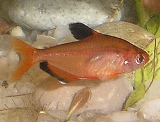
Serpae tetra
Encyclopedia
Serpae tetras are one species of the genus Hyphessobrycon
, now known as Hyphessobrycon eques. These South American tropical characids are popular aquarium
fishes, often identified as "Red Minor tetras". They are found in nature in the Madeira and Guaporé regions of the Amazon river
, and in upper Paraguay
 Serpae tetras prefer water temperatures ranging from 72-79°F (22-26°C). They will generally do better and show off their best colors in soft, neutral to slightly acidic water. As with any other schooling fish, they thrive in large groups and should be kept in schools of at least 6-10 fish. The tank should be well-planted, which provides shelter and hiding spots.
Serpae tetras prefer water temperatures ranging from 72-79°F (22-26°C). They will generally do better and show off their best colors in soft, neutral to slightly acidic water. As with any other schooling fish, they thrive in large groups and should be kept in schools of at least 6-10 fish. The tank should be well-planted, which provides shelter and hiding spots.
They have a reputation of being fin-nippers although this is disputed. If any aggression is seen in the fish, it is usually amongst themselves rather than aimed at tankmates outside of their species, especially if they are kept in large groups where they can establish a pecking order (a behavior similar to Puntius tetrazona
). Their typical temperament and striking appearance (red with a black diamond on the flank) makes them an excellent addition to the community aquarium.
on which they can lay eggs. Filtering through peat
moss can also be helpful. The eggs hatch in about a day.
The average lifespan for a Serpae tetra is about seven years.
Hyphessobrycon
Hyphessobrycon is a genus of freshwater fish in the characin family of order Characiformes. The Hyphessobrycon species are among the fishes known as tetras. All species of this genus are native to the Neotropic ecozone in South America.-Taxonomy:This large genus of characins includes over 100...
, now known as Hyphessobrycon eques. These South American tropical characids are popular aquarium
Aquarium
An aquarium is a vivarium consisting of at least one transparent side in which water-dwelling plants or animals are kept. Fishkeepers use aquaria to keep fish, invertebrates, amphibians, marine mammals, turtles, and aquatic plants...
fishes, often identified as "Red Minor tetras". They are found in nature in the Madeira and Guaporé regions of the Amazon river
Amazon River
The Amazon of South America is the second longest river in the world and by far the largest by waterflow with an average discharge greater than the next seven largest rivers combined...
, and in upper Paraguay
Paraguay
Paraguay , officially the Republic of Paraguay , is a landlocked country in South America. It is bordered by Argentina to the south and southwest, Brazil to the east and northeast, and Bolivia to the northwest. Paraguay lies on both banks of the Paraguay River, which runs through the center of the...
In the Aquarium

They have a reputation of being fin-nippers although this is disputed. If any aggression is seen in the fish, it is usually amongst themselves rather than aimed at tankmates outside of their species, especially if they are kept in large groups where they can establish a pecking order (a behavior similar to Puntius tetrazona
Tiger barb
The tiger barb or Sumatra barb, is a species of tropical freshwater fish belonging to the Puntius genus of the minnow family. The natural geographic range reportedly extends throughout the Malay Peninsula, Sumatra and Borneo, with unsubstantiated sightings reported in Cambodia...
). Their typical temperament and striking appearance (red with a black diamond on the flank) makes them an excellent addition to the community aquarium.
Breeding
Breeding, as with most other tetras, can be difficult due to there being few obvious differences between the genders. However, males are usually more slim and smaller than females. There is also a visible difference between the shape of the swim bladder, which can be seen above and behind the silverish abdominal cavity. To breed these fish, they should be given a small, dedicated breeding tank planted with thick bunches of fine-leaved plants such as MyriophyllumMyriophyllum
Myriophyllum is a genus of about 69 species of freshwater aquatic plants, with a cosmopolitan distribution. The center of diversity for Myriophyllum is Australia with 43 recognized species...
on which they can lay eggs. Filtering through peat
Peat
Peat is an accumulation of partially decayed vegetation matter or histosol. Peat forms in wetland bogs, moors, muskegs, pocosins, mires, and peat swamp forests. Peat is harvested as an important source of fuel in certain parts of the world...
moss can also be helpful. The eggs hatch in about a day.
The average lifespan for a Serpae tetra is about seven years.
External links
- Serpae tetra FAQ at AquaDaily.
- Serpae Tetra Fact Sheet

